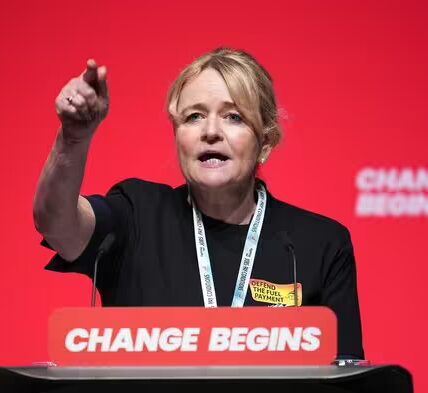The injunction sought by the authority, if granted, would require the company to stop housing asylum seekers at the hotel within 14 days.

Protesters calling for the closure of The Bell Hotel, believed to be housing asylum seeker (Image: AFP via Getty Images)
A hotel has been told it should not accept any more asylum seekers until Tuesday, when it will discover whether it will have to temporarily stop housing them. Epping Forest District Council in Essex is seeking an interim injunction stopping migrants from being accommodated at the Bell Hotel in Epping, which is owned by Somani Hotels Limited.
It comes following a series of protests in recent weeks outside the hotel after an asylum seeker who was housed at the hotel was charged with sexually assaulting a 14-year-old girl. At a hearing on Friday, council barristers claimed Somani Hotels breached planning rules because the site is not being used for its intended purpose as a hotel and that the situation “could not be much worse.” The injunction sought by the authority, if granted, would require the company to stop housing asylum seekers at the hotel within 14 days.
Barristers for the company said the “draconian” move would cause “hardship” for those inside the hotel, and that “political views” were not grounds for an injunction to be granted, the BBC reports.
They also said that contracts to house asylum seekers were a “financial lifeline” for the hotel, which was only 1% full in August 2022, when it was open to paying customers.
At the end of the hearing, Mr Justice Eyre said: “I am not going to close my notebook and give a decision now.
“I am going to reflect on this, but we need a decision sooner rather than later.”
The judge later said that he would give a ruling at 2pm on Tuesday.

Police officers stand outside the The Bell Hotel (Image: AFP via Getty Images)
He also ordered that Somani Hotels could not “accept any new applications” from asylum seekers to stay at the site until he had ruled on whether to grant the temporary injunction.
The hotel has become the focal point of a series of protests after Hadush Gerberslasie Kebatu, 38, was charged with trying to kiss a teenage girl.
Kebatu, who was housed at the hotel at the time of the incident, denies the allegations and is due to stand trial later this month.
Opening the hearing in London, Philip Coppel KC, for the council, said the authority had a “very serious problem” which was “getting out of hand” and causing “great anxiety” to residents.
He said this had been caused by a “breach of planning control” by the company, with the site “no more a hotel than a borstal to a young offender” for asylum seekers.

Protesters calling for the closure of The Bell Hotel earlier this month (Image: AFP via Getty Images)
In written submissions, Mr Coppel said there was a “preponderance of factors overwhelmingly in favour of granting an injunction”, which included removing “the catalyst for violent protests in public places”.
Concluding his submissions, Mr Coppel told Mr Justice Eyre that if an injunction was not granted, “Your Lordship will be telling the residents in Epping: ‘You have just got to lump it’.”
Piers Riley-Smith, representing Somani Hotels, told the court in written submissions that the alleged planning breach was “not flagrant” and that it was “entirely wrong” for the council to “suggest the use has been hidden from them”.
The barrister told the court the hotel previously housed asylum seekers from May 2020 to March 2021, and from October 2022 to April 2024.
He also said that while the company did apply for planning permission for a “temporary change of use” in February 2023, this was a “pragmatic attempt to address the claimant’s concerns, rather than an acceptance that such a use required planning permission”.
This application was later withdrawn as it had not been determined by April 2024, the barrister said.
Asylum seekers then began being placed in the Bell Hotel again in April 2025, with Mr Riley-Smith stating a planning application was not made “having taken advice from the Home Office”.
In court, he said that while there were genuine concerns among local residents, these had “expanded” to include “concerns about wider ideological and political issues from those outside the community”.
He continued that these “particular ideological, non-community concerns are not relevant to planning”, and that the concerns of local residents did not “justify” a temporary injunction.


